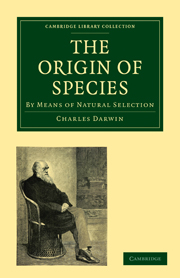 The Origin of Species
The Origin of Species Book contents
- Frontmatter
- Contents
- INSTRUCTION TO BINDER
- ADDITIONS AND CORRECTIONS, TO THE SIXTH EDITION
- HISTORICAL SKETCH
- INTRODUCTION
- CHAPTER I VARIATION UNDER DOMESTICATION
- CHAPTER II VARIATION UNDER NATURE
- CHAPTER III STRUGGLE FOR EXISTENCE
- CHAPTER IV NATURAL SELECTION; OR THE SURVIVAL OF THE FITTEST
- CHAPTER V LAWS OF VARIATION
- CHAPTER VI DIFFICULTIES OF THE THEORY
- CHAPTER VII MISCELLANEOUS OBJECTIONS TO THE THEORY OF NATURAL SELECTION
- CHAPTER VIII INSTINCT
- CHAPTER IX HYBRIDISM
- CHAPTER X ON THE IMPERFECTION OF THE GEOLOGICAL RECORD
- CHAPTER XI ON THE GEOLOGICAL SUCCESSION OF ORGANIC BEINGS
- CHAPTER XII GEOGRAPHICAL DISTRIBUTION
- CHAPTER XIII GEOGRAPHICAL DISTRIBUTION—continued
- CHAPTER XIV MUTUAL AFFINITIES OF ORGANIC BEINGS: MORPHOLOGY: EMBRYOLOGY: RUDIMENTARY ORGANS
- CHAPTER XV RECAPITULATION AND CONCLUSION
- GLOSSARY OF SCIENTIFIC TERMS
- INDEX
- Plate section
CHAPTER IV - NATURAL SELECTION; OR THE SURVIVAL OF THE FITTEST
Published online by Cambridge University Press: 29 August 2010
- Frontmatter
- Contents
- INSTRUCTION TO BINDER
- ADDITIONS AND CORRECTIONS, TO THE SIXTH EDITION
- HISTORICAL SKETCH
- INTRODUCTION
- CHAPTER I VARIATION UNDER DOMESTICATION
- CHAPTER II VARIATION UNDER NATURE
- CHAPTER III STRUGGLE FOR EXISTENCE
- CHAPTER IV NATURAL SELECTION; OR THE SURVIVAL OF THE FITTEST
- CHAPTER V LAWS OF VARIATION
- CHAPTER VI DIFFICULTIES OF THE THEORY
- CHAPTER VII MISCELLANEOUS OBJECTIONS TO THE THEORY OF NATURAL SELECTION
- CHAPTER VIII INSTINCT
- CHAPTER IX HYBRIDISM
- CHAPTER X ON THE IMPERFECTION OF THE GEOLOGICAL RECORD
- CHAPTER XI ON THE GEOLOGICAL SUCCESSION OF ORGANIC BEINGS
- CHAPTER XII GEOGRAPHICAL DISTRIBUTION
- CHAPTER XIII GEOGRAPHICAL DISTRIBUTION—continued
- CHAPTER XIV MUTUAL AFFINITIES OF ORGANIC BEINGS: MORPHOLOGY: EMBRYOLOGY: RUDIMENTARY ORGANS
- CHAPTER XV RECAPITULATION AND CONCLUSION
- GLOSSARY OF SCIENTIFIC TERMS
- INDEX
- Plate section
Summary
How will the struggle for existence, briefly discussed in the last chapter, act in regard to variation? Can the principle of selection, which we have seen is so potent in the hands of man, apply under nature? I think we shall see that it can act most efficiently. Let the endless number of slight variations and individual differences occurring in our domestic productions, and, in a lesser degree, in those under nature, be borne in mind; as well as the strength of the hereditary tendency. Under domestication, it may be truly said that the whole organisation becomes in some degree plastic. But the variability, which we almost universally meet with in our domestic productions, is not directly produced, as Hooker and Asa Gray have well remarked, by man; he can neither originate varieties, nor prevent their occurrence; he can only preserve and accumulate such as do occur. Unintentionally he exposes organic beings to new and changing conditions of life, and variability ensues; but similar changes of conditions might and do occur under nature. Let it also be borne in mind how infinitely complex and close-fitting are the mutual relations of all organic beings to each other and to their physical conditions of life; and consequently what infinitely varied diversities of structure might be of use to each being under changing conditions of life.
- Type
- Chapter
- Information
- The Origin of SpeciesBy Means of Natural Selection, or the Preservation of Favoured Races in the Struggle for Life, pp. 62 - 105Publisher: Cambridge University PressPrint publication year: 2009First published in: 1859
